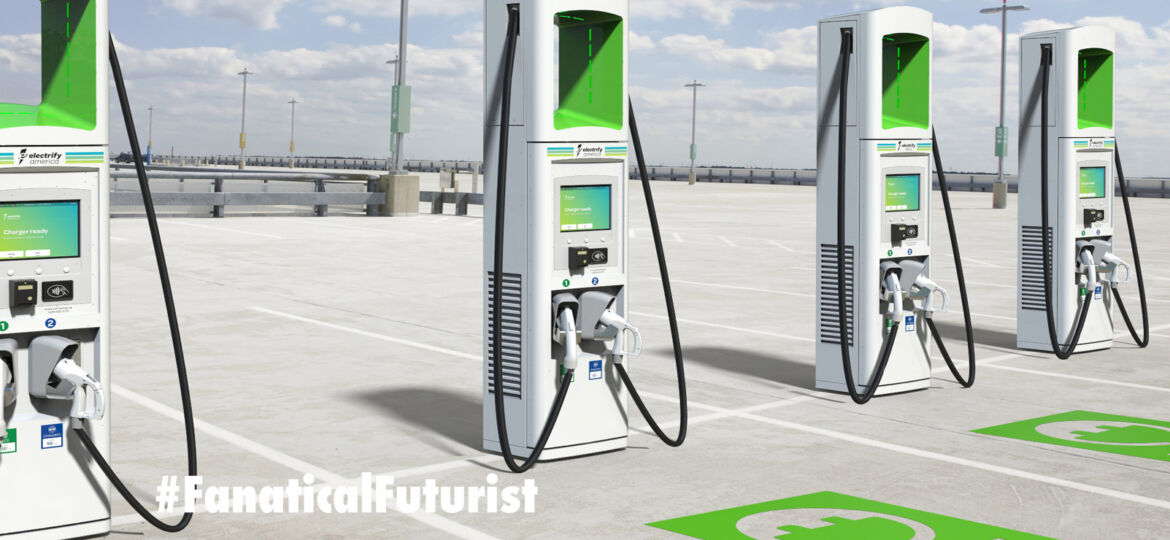
WHY THIS MATTERS IN BRIEF
Unless you’d been asleep at the wheel recently you can’t help but notice that it looks like the days of the combustion engine are numbered and that electric vehicles are the future…
It’s no secret that Volkswagen wants to sell more electric cars in the US, especially as countries around the world, from France and India to China and the UK all ban the sale of combustion engines from 2030 or 2040 onwards, but in order to do that it looks like it first needs to spend millions of dollars on building out the country’s underdeveloped electric vehicle charging infrastructure, that despite recent announcements by the US Government to electrify thousands of miles of highways, still lags way behind China’s huge EV charging network which is on the cusp of reaching not thousands but hundreds of thousands of charging stations.
Toward that end, the auto giant’s subsidiary, Electrify America, announced recently that it plans to install EV charging stations at more than 100 Walmarts in 34 states by mid 2019, and the announcement came a few days after Porsche, which is also owned by VW Group, hinted at its own plans to build 500 of its own EV charging stations across the US.
The Walmart charging stations are part of a broader Electrify America project to install 2,000 chargers at nearly 500 charging stations across the country by June 2019.
“EV owners need a convenient, reliable and fast turnaround in recharging their vehicles,” said Mark McNabb, president and CEO of Electrify America, in a statement, “Walmart is the perfect partner for Electrify America to bring electric charging services to EV owners who value their time.”
Meanwhile, Klaus Zellmer, CEO of Porsche Cars North America said that the performance brand would install at least 500 fast chargers at dealerships and highway locations across the US by the end of 2019.
“If you want to buy an electric car then you’ll likely want to know what happens if I go skiing or go further than 300 miles,” Zellmer said, “what do I do? So we need to have answers for that.”
Taken together, these represent a multi-million dollar commitment by the German auto giant to blanket the US in charging stations in the hopes of luring more American consumers to by its zero emission vehicles. Another way of looking at it is that VW is taking a page from the playbook of Tesla, which has installed 1,210 of its Supercharger stations around the world since 2012 as VW realises that to persuade more American car buyers to consider going electric, it must first commit to a fully built charging network that helps reduce a phenomenon that’s increasingly being referred to as “range anxiety.”
Both VW and Porsche plan to spend billions of dollars on rolling out new electric cars in the years to come. Earlier this year, Porsche said it would double its investment in plug-in hybrids and pure EVs by 2022 to more than 6 billion euros ($7.43 billion), and the brand’s first EV, the Mission E, is seen as one of the first real competitors to the Tesla Model S. The automaker has said the Mission E would be able to charge in as little as 15 minutes, meanwhile, a second EV based on the Mission E Cross Turismo concept, is planned for deliveries in 2020.
VW is also making a very big bet on electric cars over the next decade or so, and the I.D. Vizzion — much like its I.D. siblings — looks like it will be a centerpiece of that push. VW claims a production Vizzion will be able to reach over 400 miles on a single charge, thanks to a battery pack that, at 111kWh, is bigger than anything Tesla currently offers.
The Mission E and Vizzion I.D. are sorely needed if VW is going to stand any hope of trying to compete with Tesla, especially as the automaker currently only has one EV on the market, the rather lame 125 mile range e-Golf. Certainly more affordable than the Model S, the e-Golf has been selling briskly in Europe, recently dethroning the Renault Zoe as the continent’s best-selling battery-electric vehicle, but so far only 178 e-Golfs have been sold in the US in January 2018.
Recently, VW said it would tweak its iconic logo in preparation for the electric car era. The company is trying to burnish its brand in the aftermath of the diesel emissions cheating scandal that has cost it billions of dollars in fines and settlements and sent several former executives to prison. But, looking further ahead, as a few car manufacturers like BMW and others start developing wirelessly charged electric cars I have to ask – is building out a standard supercharger network, that, for example, can’t accommodate tomorrow tomorrow’s EV’s a sound plan?
















